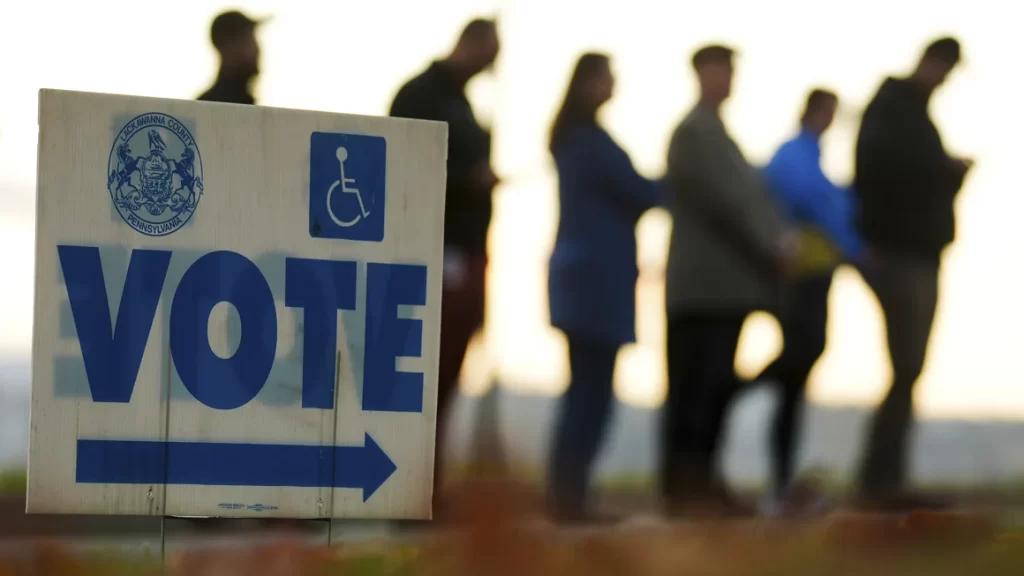Voting nationwide has been orderly though officials report some scattered issues
4 min read
Voters wait in line to cast their ballots at Scranton High School in Scranton, Pennsylvania, on Election Day, Tuesday, Nov. 5, 2024. Matt Rourke/AP

Voters wait in line to cast their ballots at Scranton High School in Scranton, Pennsylvania, on Election Day, Tuesday, Nov. 5, 2024. Matt Rourke/AP
American voters went to the polls Tuesday for a pivotal election, casting their votes in what has become a massive democratic operation, with millions of ballots cast across the nation. Despite the overwhelmingly smooth process, there have been some localized issues—ranging from bad weather to logistical challenges and claims of voter fraud—that have attracted scrutiny. These issues, however, have not overshadowed the larger picture of a secure and orderly election process.
Election officials reported minor disruptions throughout the day, but most of these were expected and routine. Cait Conley, a senior adviser at the Cybersecurity and Infrastructure Security Agency (CISA), noted that while there were some localized infrastructure disruptions and bad weather, there have been no significant national incidents affecting the integrity of the election. “The issues so far are largely expected and planned-for events,” she added, reassuring the public about the security of the voting process.
One of the more serious disruptions occurred in Union City, Georgia, just outside Atlanta. There, a series of bomb threats forced the temporary closure of two polling locations. Georgia Secretary of State Brad Raffensperger confirmed that these threats originated from Russia, and the FBI is involved in coordinating a response with local law enforcement. Despite the scare, voters were still able to cast their ballots in surrounding areas, and election officials worked to ensure their safety and the security of the process.
Elsewhere in the U.S., severe weather conditions presented additional challenges. Heavy rains and floods in Missouri, Arkansas, and Illinois caused power outages and road closures, affecting millions of voters. Parts of Louisiana also experienced damaging winds and tornadoes due to a cold front. In California, high winds and dry conditions prompted concerns over potential fire hazards in the Bay Area and Sacramento, adding another layer of complexity to the voting process in those regions.
In Pennsylvania, some voters experienced delays due to a “software malfunction” that prevented ballots from being properly scanned. The malfunction, caused by a printing error, prompted election officials to extend voting hours in Cambria County and send new ballots to polling places. The affected ballots will be hand-counted, ensuring no votes are lost.
Despite these isolated challenges, the vast majority of voters reported positive experiences. According to a Pew Research Center survey conducted after the 2020 election, 94% of voters said it was “very or somewhat easy” to vote. Only 6% reported difficulties, most commonly due to long wait times or issues with mail-in ballots. Many of these issues, however, were considered part of the usual logistics of managing a nationwide election.
Election officials nationwide have consistently reassured the public about the integrity of the voting process. “Here in Georgia, it is easy to vote and hard to cheat,” said Raffensperger, emphasizing the security of the state’s election systems. Michigan Secretary of State Jocelyn Benson also warned voters about misinformation, noting that foreign actors could try to sow confusion and doubt during the election. “Don’t fall for it,” she urged, stressing that the election process was transparent and secure.
Amidst the smooth functioning of the election, former President Donald Trump and many of his supporters continue to claim that the voting process is rigged. These false claims, which Trump has made repeatedly, allege widespread voter fraud, including voting by noncitizens and unverified mail-in ballots. Despite the lack of evidence for these accusations, Trump’s rhetoric has contributed to a climate of doubt surrounding the election, especially among his supporters.
Nationwide, the U.S. election system remains a decentralized operation, with local jurisdictions responsible for counting votes, reporting results, and certifying outcomes. In 2020, more than 161 million people cast their ballots in 132,556 polling places across 50 states, the District of Columbia, and five U.S. territories. The sheer scale of the operation demonstrates the incredible effort required to run an election of this magnitude.
According to a recent Pew survey, a majority of Americans are confident that this election will be well-managed. However, there is a notable divide between political parties. Supporters of Vice President Kamala Harris expressed significantly more confidence that the election would run smoothly, with 90% believing in its security, compared to just 57% of Trump supporters. Similarly, 85% of Harris supporters are confident the outcome will be clear once all votes are counted, compared to only 58% of Trump supporters.
Despite these differences, election officials remain committed to ensuring that every vote is counted and that the integrity of the process is upheld. With millions of ballots cast, the 2024 election is a testament to the resilience of U.S. democracy, and while challenges and delays are inevitable in such a large operation, the focus remains on a transparent, secure, and fair election process.
As the votes continue to be counted, officials urge the public to remain patient and trust in the integrity of the system, despite the challenges and rhetoric that may surround the process.